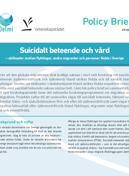Symptoms of post-traumatic stress disorder (PTS) are common in children and young people who have come to Sweden as unaccompanied minors. These symptoms include intrusive difficult memories and nightmares, a feeling of being up in arms and trying to avoid thinking about or being reminded of what has happened. PTSD, post-traumatic stress disorder, is the fully developed form and is a psychiatric diagnosis.
A study from 2016 found that 76 percent of the 208 unaccompanied adolescents who were examined in connection with their visit to a clinique for asylum health showed high levels of PTS symptoms. Longitudinal studies from Norway and Belgium, which followed refugee youth for a long time, have found that PTS is not transient but continues to affect half of the unaccompanied young people over time.
PTS in refugee children can thus be regarded as a public health problem in the group that requires care based on a preventive approach. Preventive measures can be divided into three different levels: universal, targeted and indicated measures. Indicated interventions are applied when a person shows a risk of illness without having yet been diagnosed. An indicated preventive measure for post-traumatic stress disorder is Teaching Recovery Techniques (TRT).
TRT is a manual-based group intervention that has been developed to reduce symptoms of post-traumatic stress disorder in children and adolescents. The program is based on trauma-focused cognitive behavioral therapy, which is a common intervention for children and young people suffering from post-traumatic stress. The present study aims to evaluate the effects of TRT on symptoms of post-traumatic stress and depression in a Scandinavian context on the target group of unaccompanied adolescents outside specialist care and to examine participants' experiences of the program based on theories of important factors for adaptation to traumatic events.
Conclusions and recommendations
- Post-traumatic stress disorder (PTS) in refugee children is a public health problem that needs to be treated based on a preventive approach. It is also common for unaccompanied adolescents to be hesitant to seek psychological help due to the stigma of mental illness. It is thus important that preventive efforts are easily accessible, free from stigma and close to young people's everyday lives.
- Teaching Recovery Techniques (TRT) is a manual-based group intervention that has been developed to minimize symptoms of post-traumatic stress disorder in children and adolescents. The program is based on trauma-focused cognitive behavioral therapy, which is the accepted intervention for children and young people suffering from post-traumatic stress.
- TRT should be seen as an intermediate step in a structured care of PTS in refugee children. It is thus important that there are efforts against PTS in refugee children at several levels.
About the author
Anna Sarkadi is professor and specialist physician at Department of Public Health and Caring Sciences, Social medicine/CHAP at Uppsala university. She is also the leader of a group that works with research on child health and parenting.
Policy Brief 2019:8 is only available in Swedish.
Picture by Warren Wong from Unsplash.

